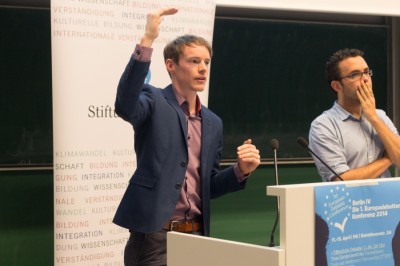How does TTIP affect the Schwarzwälder Kirschtorte? The first European Debates Conference in Berlin
Kai Dittmann began cautiously. “It often is not easy to argue for free trade,” said the 2014 World Champion in the category English as a Second Language (ESL). “But it is the marginal benefits that sum up.” Together with John Eltringham, who works at the American Academy in Berlin, he represented the government side in a public debate on the first evening of the Berlin Intervarsity. The question debated was: “Does Europe need the Transatlantic Trade and Investment Partnership (TTIP)?”
Kai’s caution was proven right. The event took place in form of an Oxford Style Public Debate, which has at its heart a long Q&A-session inviting the audience to contribute statements or questions of one minute. Nearly all questions addressed the government. Would the German Mittelstand-economy survive in an economic area as big as the transatlantic one? Wouldn’t Euro-sceptics in Sweden be even more alienated? Would TTIP discourage regulation because regulators might fear being sued? How would Russia and China react?
The opposition side was represented by Rebecca Irvine of Melbourne and Philipp Stiel, German Champion of debating in 2010. They tried to refute the government in a two-way strategy: Either the trade agreement would not have a noticeable effect – particularly no significant increase in economic growth – or it would necessitate compromising European standards in consumer protection and labour laws.
The example that carried throughout the debate was the traditional German cookie fabricants. Would they be able to compete in a market so big? The government side pointed out that if they did not, it would be because consumers found them to be too expensive or American cookies to be superior. In any case, individuals would benefit from more choice. The opposition used the cookie example for a more general argument critical of globalization, saying that, in Philipp’s words, “there is a limit to free trade.” It is more important to have local bakeries, he explained, than to offer cheaper cookies.
Later, the cookie was expanded into the Schwarzwälder Kirschtorte (black forest cake), “the magic pastry delight Germany gave us”, as it was described by one audience member. John from the government did not believe that such traditions were in danger, saying that the cake has already lived through both world wars and would also survive TTIP.
Christoph Krakowiak moderated the debate. Although many more questions had been offered, he had to end the debate after two hours. The event concluded with an open vote on the issue. In a secret voting before the debate, the audience had slightly favoured TTIP, with 28 voting yes, 24 voting no, and 18 abstaining. In the open vote, abstention was no longer allowed. The results showed a clear win for the opposition, with only 19 audience members voting in favour of TTIP (32%) and 40 voting against it (68%).
The European Debates Conference consists of this public debate, which was held in the Humboldt University in Berlin on Friday April 12th, and the Berlin IV international debating tournament starting on the same day. The conference is organized by the Berlin Debating Union and the Association of German Speaking University Debating Societies (Verband der Debattierclubs an Hochschulen e.V., VDCH). It has been supported financially and logistically by the Stiftung Mercator .
For a second European Debates Conference in 2014, the VDCH is looking for a convening debating society, as the Achte Minute has reported (German).
hug/kem







